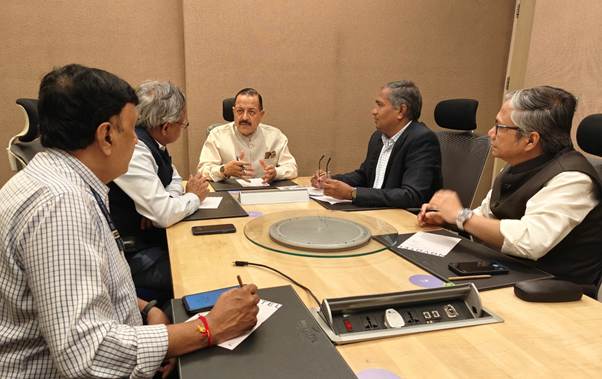Hyderabad: Union Minister of State (Independent Charge) for Science & Technology, Dr. Jitendra Singh, lauded the transformative scientific contributions of Hyderabad’s premier CSIR institutions during a high-level review meeting. The Minister commended the achievements of CSIR-Indian Institute of Chemical Technology (CSIR-IICT), CSIR-National Geophysical Research Institute (CSIR-NGRI), and CSIR-Centre for Cellular and Molecular Biology (CSIR-CCMB), highlighting their pioneering roles in drug discovery, genetic diagnostics, sustainable technologies, and earth sciences.
The meeting, held to assess recent work outcomes, underscored the momentum gained by these institutions under the vision and personal encouragement of Prime Minister Narendra Modi over the past decade. Directors of all three institutes—Dr. D. Srinivasa Reddy (CSIR-IICT), Dr. Prakash Kumar (CSIR-NGRI), and Dr. Vinay Nandicoori (CSIR-CCMB)—presented detailed insights into their respective institute’s scientific progress and societal contributions.
Dr. D. Srinivasa Reddy, Director of CSIR-IICT, showcased the institute’s extensive work in advancing India’s chemical and pharmaceutical sectors. From developing cost-effective Active Pharmaceutical Ingredients (APIs) to creating safer agrochemicals, CSIR-IICT has remained at the forefront of industrial innovation. The institute’s work in catalysis has led to the development of novel catalysts for critical industrial processes such as hydrogenation and polymerization. Notably, CSIR-IICT has collaborated with GreenWorksBio to develop compostable plastics and partnered with Gujarat Alkalies and Chemicals Limited (GACL) to produce Hydrazine Hydrate, a key industrial chemical. In the domain of sustainability, the institute’s Anaerobic Gas Lift Reactor (AGR) technology is facilitating the efficient conversion of biodegradable waste into biogas and bio-manure.
Dr. Vinay Nandicoori, Director of CSIR-CCMB, emphasized the institute’s dual focus on fundamental research and real-world application. Renowned for being the first Indian institution to develop DNA fingerprinting technology, CCMB continues to lead in molecular biology and biotechnology. During the COVID-19 pandemic, the institute swiftly developed indigenous diagnostic kits and surveillance systems, and advanced mRNA vaccine technologies. One of its flagship contributions includes a low-cost, sensitive diagnostic kit for sickle cell anemia, developed under the National Sickle Cell Elimination Mission. The institute also launched India’s first rare disease registry and is actively researching tuberculosis, encephalitis, and other critical illnesses. Through its Atal Incubation Centre (AIC-CCMB), the institute has mentored over 160 biotech startups. CCMB also plays a crucial role in conservation genetics, studying endangered species like tigers and olive ridley turtles and supporting wildlife forensics to combat illegal poaching.
Dr. Prakash Kumar, Director of CSIR-NGRI, detailed the institute’s achievements in geoscience and national infrastructure. NGRI has developed India’s first strain map to assess seismic vulnerability in the Himalayan and Indo-Gangetic regions, a milestone for disaster preparedness. The institute is engaged in deep seismic profiling in central India to understand tectonic activity and mineral resource potential. NGRI’s work in geothermal energy exploration, particularly in Ladakh and Chhattisgarh, represents a promising frontier for clean, renewable energy.
Impressed by the range and depth of scientific achievements, Dr. Jitendra Singh praised the Hyderabad-based CSIR labs for their role in advancing India’s scientific landscape. He emphasized the importance of science-based solutions in tackling national challenges and reinforcing India’s transition to a knowledge-driven, self-reliant economy. “Hyderabad has truly evolved into a thriving ecosystem for scientific research, innovation, and entrepreneurship,” the Minister said.
As a forward-looking step, it was decided during the meeting to host a CSIR Startup Conclave in Hyderabad on April 22–23, 2025. Jointly organized by CSIR-IICT, CSIR-NGRI, and CSIR-CCMB, the conclave will focus on fostering collaboration between research institutions and startups and promoting innovation-led entrepreneurship.





